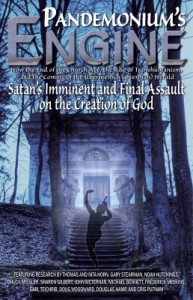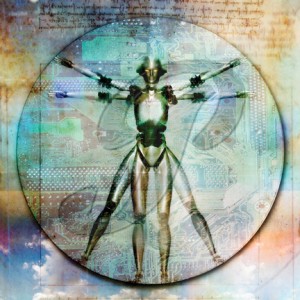 This is in response to Guillermo Santamaria’s follow up, Why Christianity & Transhumanism Are Not Enemies 2. Not only did Santamaria fail to engage my critique of his first essay, he followed the same fallacious line of reasoning. Santamaria seems to believe that two belief systems which have a few superficial things in common are necessarily compatible. He equates the transhumanist hope of immortality with the Christian hope. This is a misrepresentation of both worldviews and does a disservice to Christians and transhumanists alike. In this way, he is a lot like a religious pluralist.
This is in response to Guillermo Santamaria’s follow up, Why Christianity & Transhumanism Are Not Enemies 2. Not only did Santamaria fail to engage my critique of his first essay, he followed the same fallacious line of reasoning. Santamaria seems to believe that two belief systems which have a few superficial things in common are necessarily compatible. He equates the transhumanist hope of immortality with the Christian hope. This is a misrepresentation of both worldviews and does a disservice to Christians and transhumanists alike. In this way, he is a lot like a religious pluralist.
A religious pluralist argues that all religions are equal paths to God. Like pluralists, his arguments are all self-defeating. As an illustration, consider that most religions extend some sort of hope for an afterlife. Does this similarity mean they are compatible? For instance, Mormonism teaches that faithful Mormon men become gods and are given reign over their own personal planet. Being an equal opportunity faith, their many Mormon wives get the privilege of birthing the new populations for said planet.[1] Of course, this bears little resemblance to biblical Christianity, whose hope is God coming down to earth to restore creation to its original Edenic state (Re 21). Thus, no one could ever coherently argue that these two belief systems are compatible, because they cannot both be right. They have superficially similar but ultimately contradictory hopes. Logically, they could both be wrong but under no circumstances can both be right.
In logic, the law of the excluded middle means that a proposition is either true or false.[2] Think of it in terms that there is no middle ground between a  proposition being true and being false. Every statement has to be one or the other. Its either you become a god and have celestial conjugal relations on your personal planet or believe the Gospel of Jesus Christ and you inherit a place in the New Jerusalem worshipping Christ (Eph 1:18). It’s one or the other, the exalted man god of Mormonism or the triune God of scripture. It’s an “either or” situation, “both and” is not an option.
proposition being true and being false. Every statement has to be one or the other. Its either you become a god and have celestial conjugal relations on your personal planet or believe the Gospel of Jesus Christ and you inherit a place in the New Jerusalem worshipping Christ (Eph 1:18). It’s one or the other, the exalted man god of Mormonism or the triune God of scripture. It’s an “either or” situation, “both and” is not an option.
The same applies to transhumanism which is really just another alternative religious belief. The Bible commands Christians to question religious beliefs (e.g., Deut. 13:1–5; 1 John 4:1; Gal. 1:8; 2 Cor. 11:13). In my chapter, “Christian Transhumanism: Pandemonium’s Latest Ploy” in the new book Pandemonium’s Engine, I present an argument that transhumanism is simply the eschatology of secular humanism. In truth, it is the technocrat’s hope for an afterlife. Like Mormonism, it is an alternative to the Christian hope. Santamaria expresses it this way:
If the hopes and dreams of the transhumanists come true, eventually our consciousness or our minds will be implanted in a machine.
This will never happen. But the Bible presents the Christian’s hope as a resurrection body like that Jesus had when he was resurrected. Why would any Christian trade basking in the radiant glory of Christ to upload their consciousness into a paltry tin can? 1 Corinthians 15 is such a foundational chapter for understanding the biblical hope that I commend it to the reader for study. The intellectually honest reader will quickly see that it is clearly incompatible with the cyborgian fantasy of transhumanism.
“There are heavenly bodies and earthly bodies, but the glory of the heavenly is of one kind, and the glory of the earthly is of another.”(1 Co 15:40)
“Christ will transform our lowly body to be like his glorious body, by the power that enables him even to subject all things to himself.”(Php 3:21)
Santamaria quotes John 3:6 out of context and argues,
This principle was around long before Jesus spoke it. Transhumanism does not violate it, rather enforces it and enhances it.
But John 3:6 is not an esoteric principle meant to stand on its own. When interpreting scripture (or anyone’s writing) it is essential to read paragraphs to get the flow of the idea being presented. The verse he cherry picked is part of Jesus explanation of the second birth to Nicodemus:
“That which is born of the flesh is flesh, and that which is born of the Spirit is spirit. Do not marvel that I said to you, ‘You must be born again.’ The wind blows where it wishes, and you hear its sound, but you do not know where it comes from or where it goes. So it is with everyone who is born of the Spirit.”(Jn 3:6–8)
If you believe Jesus, why would ever accept a tawdry substitute like transhumanism? In truth, Christians do not dread physical death (Php 1:21) as we have a radically different hope than the transhumanist:
But we do not want you to be uninformed, brothers, about those who are asleep, that you may not grieve as others do who have no hope. For since we believe that Jesus died and rose again, even so, through Jesus, God will bring with him those who have fallen asleep. (1 Th 4:13–14)
Santamaria avoided all of my arguments addressing his first essay. Instead of engaging, he addressed a red herring:
Some will say that even if it were possible for our consciousness to dwell inside an artificial machine, this would be a rejection of the body that God gave us. But this interpretation cannot be correct.
This is not the Christian argument against transhumanism. First off, the biblical position is that consciousness is tied to one’s soul and separates from the body at physical death. At that time, one will either go immediately into the presence of God or to judgment. Second, he argues that because clothes are “enhancements” to the human body then any sort of radical enhancement is acceptable. Obviously this is a drastic over simplification, as there are wide ranges of possibilities with various consequences. My suggestion is it should be limited to healing and assistance of the handicapped. But radical life extension and the pursuit of immortality via consciousness uploading is not an enhancement. It’s a complete change in ontology. It’s becoming post human. Please refer to my previous post, Transhumanism: Sin and Hubris.
But all of this is really academic for anyone trying to live the life commended in scripture. A follower of Jesus understands that mere vanity is the plague of sin. Transhumanism is narcissism taken to its most absurd extreme. It misses the mark exemplified by Christ by a wide margin. In closing, I hope Santamaria will consider how transhumanism compares with Paul’s exhortation to the Philippians:
Do nothing from selfish ambition or conceit, but in humility count others more significant than yourselves. Let each of you look not only to his own interests, but also to the interests of others. Have this mind among yourselves, which is yours in Christ Jesus, who, though he was in the form of God, did not count equality with God a thing to be grasped, but emptied himself, by taking the form of a servant, being born in the likeness of men. And being found in human form, he humbled himself by becoming obedient to the point of death, even death on a cross. Therefore God has highly exalted him and bestowed on him the name that is above every name, so that at the name of Jesus every knee should bow, in heaven and on earth and under the earth, and every tongue confess that Jesus Christ is Lord, to the glory of God the Father. (Php 2:3–11)
 Read more about it from me and my friends Chuck Missler, Tom Horn, Gary Stearman, Carl Teichrib, Mike Bennett aka “Dr Future”, Sharon Gilbert, Noah Hutchings and more! Get a signed copy of Pandemonium’s Engine here for $10.00
Read more about it from me and my friends Chuck Missler, Tom Horn, Gary Stearman, Carl Teichrib, Mike Bennett aka “Dr Future”, Sharon Gilbert, Noah Hutchings and more! Get a signed copy of Pandemonium’s Engine here for $10.00
[1] http://contentdm.lib.byu.edu/cdm4/document.php?CISOROOT=/EoM&CISOPTR=4391&CISOSHOW=3667
[2] http://www.stanford.edu/~bobonich/glances%20ahead/IV.excluded.middle.html





